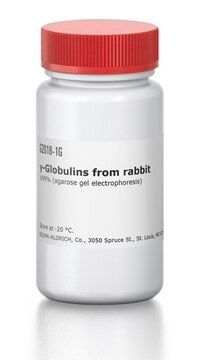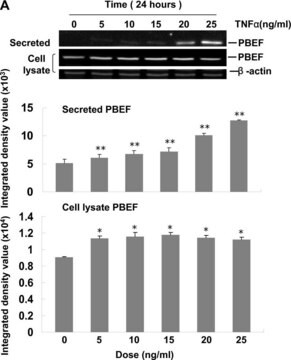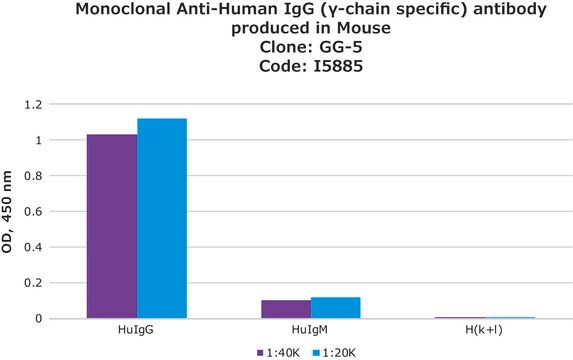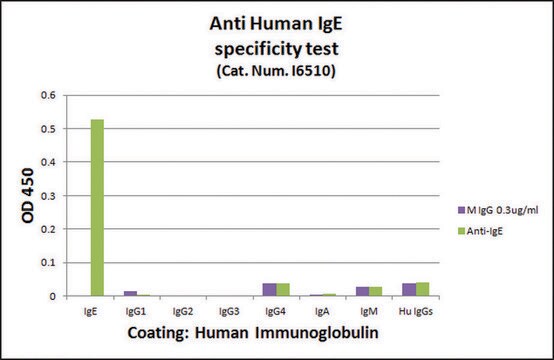추천 제품
생물학적 소스
mouse
결합
unconjugated
항체 형태
purified from hybridoma cell culture
항체 생산 유형
primary antibodies
클론
IFI-230, monoclonal
형태
buffered aqueous solution
분자량
antigen 85-95 kDa (cluster of three isotypes A, B, and C)
종 반응성
human
농도
~1 mg/mL
기술
immunocytochemistry: suitable
immunoprecipitation (IP): suitable
indirect ELISA: suitable
microarray: suitable
western blot: 0.5-1 μg/mL using whole extract of the Jurkat cell line
UniProt 수납 번호
배송 상태
dry ice
저장 온도
−20°C
타겟 번역 후 변형
unmodified
유전자 정보
human ... IFI16(3428)
일반 설명
The gene IFI-16 (interferon, γ-inducible protein 16) encodes a member of the interferon-inducible nuclear proteins family containing one or two copies of a conserved 200 amino acid repeat domain called HIN-200 domain. It has three different isoforms, IFI-16A, -16B, -16C. The IFI-16A isoform is the longest with 785 amino acids. IFI-16B is the most broadly expressed isoform with 729 amino acids and IFI-16C has 56 amino acids lesser. The three isoforms have serine and threonine residues which can be phosphorylated. The N-terminus contains an imperfect leucine zipper domain, where the isoforms homo- and heterodimerize. IFI-16 contains an N-terminal domain called DAPIN/PYRIN/CARD that may be involved in protein–protein interactions. IFI-16 is expressed in some haemopoietic lineages , such as CD34+ progenitor cells, mature lymphocytes and monocytes. The gene is mapped to human chromosome 1q22.
면역원
synthetic peptide corresponding to amino acids 768-783 at the C-terminus of human IFI-16.
생화학적/생리학적 작용
The gene IFI-16 (interferon, γ-inducible protein 16) encodes an interferon-inducible transcriptional modulator from the p200-protein family. It may play a role in negative regulation of transcription. Overexpression of this gene in older populations of human fibroblasts leads to cellular senescence. It is also associated with senescence-associated irreversible cell growth arrest in normal human prostate epithelial cells.
물리적 형태
Solution in 0.01 M phosphate buffered saline, pH 7.4, and 15 mM sodium azide.
면책조항
Unless otherwise stated in our catalog or other company documentation accompanying the product(s), our products are intended for research use only and are not to be used for any other purpose, which includes but is not limited to, unauthorized commercial uses, in vitro diagnostic uses, ex vivo or in vivo therapeutic uses or any type of consumption or application to humans or animals.
적합한 제품을 찾을 수 없으신가요?
당사의 제품 선택기 도구.을(를) 시도해 보세요.
Storage Class Code
10 - Combustible liquids
Flash Point (°F)
Not applicable
Flash Point (°C)
Not applicable
시험 성적서(COA)
제품의 로트/배치 번호를 입력하여 시험 성적서(COA)을 검색하십시오. 로트 및 배치 번호는 제품 라벨에 있는 ‘로트’ 또는 ‘배치’라는 용어 뒤에서 찾을 수 있습니다.
Wu Wei et al.
Histochemistry and cell biology, 119(1), 45-54 (2003-01-28)
IFI 16 is a member of the HIN-200 protein family named for their haemopoietic expression, interferon-inducibility and nuclear localisation. These proteins have been characterised as transcriptional regulators that modulate the cell cycle. IFI 16 is expressed in some haemopoietic lineages
Hong Xin et al.
Oncogene, 23(37), 6209-6217 (2004-06-23)
Defects in interferon (IFN) signaling that result in loss of expression of IFN-inducible proteins are associated with cellular immortalization, an important early event in the development of human cancer. Here we report that loss of IFN-inducible IFI 16 expression in
R W Johnstone et al.
The Journal of biological chemistry, 273(27), 17172-17177 (1998-06-27)
IFI 16 is a member of a family of interferon-inducible proteins, including the human MNDA (myeloid nuclear differentiation antigen), the recently identified AIM-2 (absent in melanoma), and the homologous murine molecules, p202, p204, and D3. IFI 16 contains a domain
R W Johnstone et al.
Biochemistry, 37(34), 11924-11931 (1998-08-26)
We recently demonstrated that IFI 16, a human member of a family of interferon-inducible nuclear proteins, can function as a potent repressor of transcription. All members of this family are found in the nucleus and contain 1 or 2 copies
Brendan Antiochos et al.
JCI insight, 3(18) (2018-09-21)
IFN-inducible protein 16 (IFI16) is an innate immune sensor that forms filamentous oligomers when activated by double-stranded DNA (dsDNA). Anti-IFI16 autoantibodies occur in patients with Sjögren's syndrome (SS) and associate with severe phenotypic features. We undertook this study to determine
자사의 과학자팀은 생명 과학, 재료 과학, 화학 합성, 크로마토그래피, 분석 및 기타 많은 영역을 포함한 모든 과학 분야에 경험이 있습니다..
고객지원팀으로 연락바랍니다.








